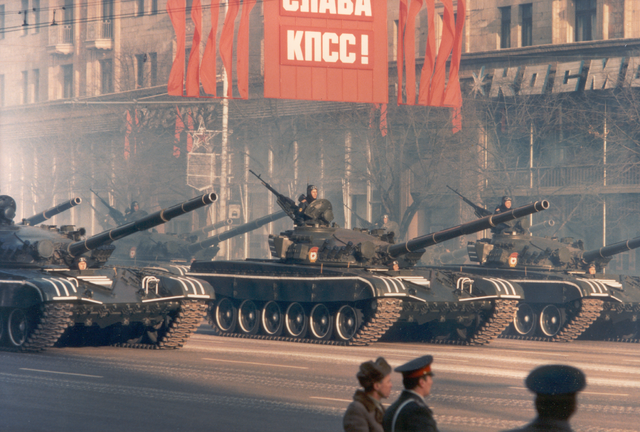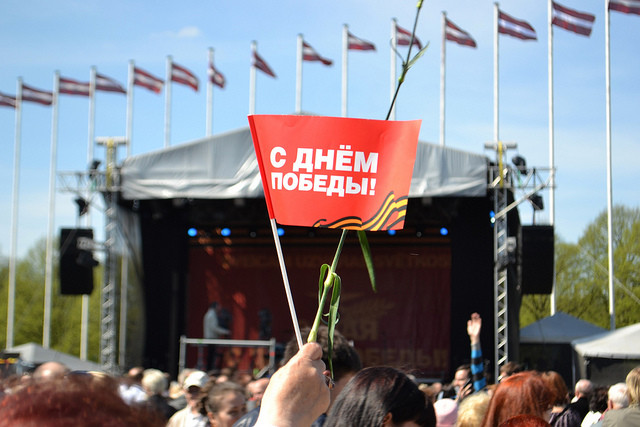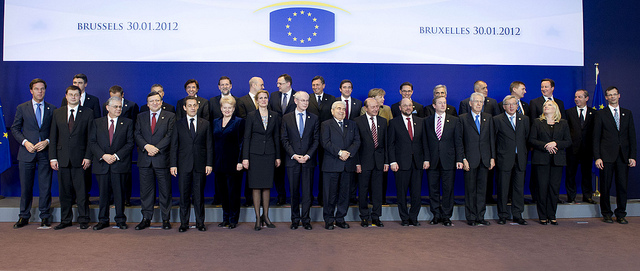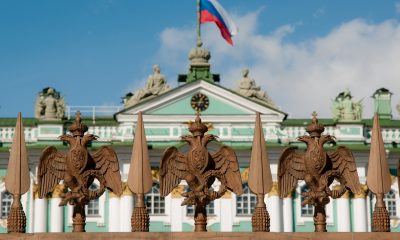Europe
Latvia in the Aftermath of 1991

Latvia along with other Baltic States was the first to break ties with the Soviet Union in 1990-1991. It has been West-oriented ever since, trying to move away from Russia as far as possible. It had been rapidly modernizing its economy to bridge the gap with other European countries. The results of such reforms were, first, joining the NATO in March 2004, and then, becoming a part of the European Union two months after.
Such distance from Russia resulted in a new driving force for Latvian rhetoric. It started to represent Russia as an aggressive massive neighbour, trying to return its borders. Ever since the collapse of the USSR, the Soviets were shown as occupants who replaced Nazi-regime. Following this approach, it meant that Latvia placed the Soviets at the same level with the Nazis. This way of thinking has been evolving and becoming more powerful each day.
Following the events in Ukraine, especially after the Crimean annexation, these assumptions seem to be on the rise. The relations with Russia have begun rapidly deteriorating. However, these interpretations of the events are different between Latvia and Russia. This, unfortunately, impairs any positive developments between the countries.
This article presents Latvian political discourse after 1991 through post-structuralistic approach (a theory in international relations). The theory itself has caused many controversies in the international relations. Many claimed that it is not a reliable theory, because it failed to establish any new theoretical basis that is able to provide scholars with an authentic framework to comprehend relations between countries (Blair, 2011; Jarvis, 2000; Selby, 2007). However, the very fact that it has generated so much heated arguments makes an immense contribution to the school of IR.
To briefly give an outline of the theory, we can start by saying that relations between countries may be understood by means of a structure that is different from reality and abstract ideas. It claims that there is no neutral point of view from which anyone can access knowledge. As Scott Burchill (2013, p.190) writes, “There is no ‘truth’, only competing interpretations. Knowledge is dependent on power. Though in philosophy and social frameworks, it has to be free from any external influences and be based on rationality, it was Kant (1991, p. 115). who cautioned that “the possession of power inevitably corrupts the free judgment of reason”.
In Nietzsche works, for instance, it is noted that by saying something about the world, a person inevitably says something about the perception of the world (Bleiker and Chou 2010, p. 9). That means that people treat facts and phenomena according to their assumptions and previous knowledge, acquired over time and later codified in language (Ibid.). Peoples’ mind is reflected by the means of language; in its turn, how the mind works depend on language. Our mind is able to construct and produce knowledge. Further, this knowledge constructs reality in which society lives.
The reality of the people who live in Latvia (yet, hardly of the people with the status of “non-citizens”[1]) is that Latvia was occupied by the USSR. On 22 August 1996, the Latvian parliament declared that the Soviet Occupation of Latvia in 1940 was a military occupation and, therefore, illegal under the law (Case of Kononov v. Latvia, 2010). Moreover, along with the government of Latvia, it has been recognized by the United States of America and the European Union. The occupation of Latvia is usually supported with the provisions of the 1939 Molotov-Ribbentrop Pact and its Secret Additional Protocol of August 1939 with Nazy Germany[2], when both countries divided their spheres of influence. However, Russia itself did not acknowledge the impact of the pact on the sovereignty of Latvia, therefore did not admit the occupation.
Ministry of Foreign Affairs of Latvia says that “The Latvian Government of 1940 had to decide between a hopeless, bloody resistance and acquiescence to an ultimatum under the threat of overwhelming military force. The regime was… under the guise of legality”[3]. It concluded that its destiny over the next 50 years was sealed by external secret treaties, protocols and agreements. This trauma drives the current political discourse after it 1991. It does not recognize the Soviet input into economy and aims to erase the history that unites Russia and Latvia.
This knowledge drives political discourse of Latvia for a long time as well as it is being delivered in all the schools of Latvia. It is told on the streets, written in the newspapers and shown on the walls of the Occupation Museum of Latvia. Yet, another historical point of view is often disregarded.
For example, according to the editor of the book in IV volumes “Latvians and Latvia”, Janis Stradins, during the Soviet time there were not only repression and oppression, but also positive things (Freecity, 2014). Apart from the presence of attributes of a sovereign state, Latvia was developing as a nation. “Latvians and Latvia” represents Soviet time only from one negative aspect. What it does not mention is that during that time many economic sectors were thriving. For instance, the largest factory of electronics and the leading communication technology producer in the USSR, Valsts elektrotehnikas fabrika (State Electrotechnical Factory) was rapidly developing. In addition, new medicine was being discovered and new technologies were being created. “Latvians have had an ability to express themselves”, says Stradins (Ibid.).
The way how one piece of history is represented results from the notion of genealogy that expresses relation of knowledge and power. As Roland Bleiker (2000, p. 25) says, “genealogies focus on the process by which we have … given meaning to particular representations of the past, representations that continuously guide our daily lives and set clear limits to political and social options”. Likewise, interpretations of the Soviet past by Latvia leave strong imprint on its society and guide peoples’ thinking and attitudes towards modern Russia. This, therefore, leads to the particular behavior when it comes to international relations.
Following the theory, these formed attitudes have been possible because power and knowledge are mutually supportive. In 1991 when Russia was recovering from its own political and economic decline, Latvia was enthusiastically celebrating its independence, freedom from the enemy. Textual construction of the USSR began with horrors and violence of the past, omitting many advantages, because it was not beneficial for political power. Russia, on the other hand, was not politically strong to be involved on that matter. This rhetoric remained in the hearts of the Latvian people that is why the nationalist political party received so much support from its population.
In this way, political power seeks its support in knowledge and at the same time it creates knowledge. Thus, knowledge and power are always interconnected. Foucault (1987, pp. 80-85) writes that one implies another: power does not exist without knowledge; knowledge does not exist without power.
This type of thought has been produced by many other scholars. Ashley (1989) draws attention to Foucault’s interrelation between the state and knowledge by referring to the principle of “statecraft is modern mancraft”. He further claims that it is man who originates knowledge, meaning that it is man’s responsibility to give meaning to events (Ibid. p. 264). Indeed, the interconnection of power and knowledge is undeniable.
Yet, a renewed Russia, which returned to the world stage after the sharp decline of the 90s as a strong political player, does not seem to be able to reverse these past and current attitudes. As powerful as it might be, Latvia has gone through almost 30 years of certain textual reconstruction that shaped the reality in which its society lives. These textual representations are fuelled by other countries who suffered from the USSR (for example, other Baltic States). All in all, interpretation of history written by many victims (and let us not forget about a strong negative image, constructed by the USA) is more powerful in the terms of influence than a single history of one country. This might be a reason for a strong political and social response after the events in Georgia in 2008 and in Ukraine recently.
However, coming back to Latvia itself, it should be highlighted that the Latvian Government has drawn a distinct line between “self” and “other”. The notion of “us, Latvians” and “them, Russians” is deeply felt because of the history and continuous political reminders that USSR undermined their independence, therefore, is to be treated as an enemy.
Scott Burchill (2013, p. 205) describes this threat for difference as a constitution of political identity. These distinctions between “self” and “others”, “us” and “Russians” are integral for Latvia which national identity has not been entirely formed. This approach significantly implicates the situation with the Russian minority. According to statistics, only around 61% of the population is Latvians. Other 32% comprises the Belarusians, Ukrainians and Russians, i. e. Russian-speaking population (The remaining 7% are people of other nationalities)[4]. Still, the majority of the former still has a passport of nepilsoņi, namely, non-citizens.
Even a sharp separating line between Russian and Latvian languages has been drawn in order to maintain Latvian identity and independence. In this scenario, all that comes out of domestic space is treated as alien, foreign and dangerous (See Campbell, 1992; 1999). Thus, the danger should be excluded.
Recently, the Centre of National Language (CNL) has obliged the citizens of Latvia to speak only Latvian language at the workplaces and even in the breaks. These restrictions are not only common in daily life but also in the social networks. For instance, mayor of Riga, Nils Usakovs has been fined by the CNL because of using Russian on his facebook page (ves.lv, 2016). Further, the CNL voiced its concerns regarding the decision of the US Embassy in Latvia to use Russian language along with Latvian and English (DELFI, 2016). On the one hand, there is comfortable environment which is inside of the country. On the other, there is a threat, posed by outside environment (See Ashleey, 1988).
Many key points of post-structuralism are issues of power and authority. It is power and authority that is able to impose certain knowledge (in the case of Latvia, the Latvian Government). It is power that may interpret events and persuade people into this. If Soviet legacy is thought to be impairing Latvian identity, then authorities will try to construct certain political discourse in order to distant itself from unwanted factors. They will consider specific time frame, choose significant facts to support arguments as well as certain perspective. This is the reason why the same facts of history (or events) are interpreted differently. After all, it is human nature to perceive, interpret and give meaning to different events.
Whether the Latvian political discourse will remain, it probably depends on the situation with migrants. After all, willing or not, Latvia has more in common with the Russian people than with incoming refugees of different culture and religion (this has been repeatedly said by the Latvian newspapers for the last months). In the end, the Soviet time, no matter how difficult it was, has left its imprint on Latvian identity. Whether Latvia will accept it is yet to be seen.
References
- Ashley, R. K., 1989. Living on Border Lines: Man, Poststructuralism and War. In: J. De Derian and M. J. Shapiro (eds.). International/Intertextual Relations: Postmodern Readings of World Politics. Lexington, Mass: Lexington Books.
- Ashley, R. K., 1988. Untying the Sovereign State: A Double Reading of the Anarchy Problematique. Millennium, 17 (2). Pp. 227-262.
- Blair, B. 2011, Revisiting the “Third Debate” (Part I). Review of International Studies, 37 (2), pp. 825 – 854.
- Bleiker, R., 2000. Popular Dissent, Human Agency and Global Politics. Cambridge: Cambridge University Press,
- Burchill, S. et al., 2013. Theories of International Relations. 5th Ed. Hampshire: Palgrave Macmillan.
- Campbell, D., 1999. Violence, Justice and Identity in the Bosnian Conflict. In: E. Edkins, N. Persram and V. Pin-Fat, Sovereignty and Subjectivity. Boulder: Lynne Riener.
- Campbell, D., 1993. Writing Security: United States Foreign Policy and the Politics of Identity. Minneapolis: University of Minnesota Press.
- Case of Kononov v. Latvia, May 17, 2010. European Court of Human Rights. [online] Available at <http://hudoc.echr.coe.int/eng?i=001-98669#{“itemid”:[“001-98669”]}> [Accessed 18 June 2016].
- DELFI, 2016. US Embassy Began Using Russian Language While Communicating with the Latvians. [online] Available at: < http://rus.delfi.lv/news/daily/latvia/posolstvo-ssha-v-socsetyah-nachalo-obschatsya-s-latvijcami-na-russkom-yazyke.d?id=47806159> [Accessed 30 July 2016].
- Foucault, M., 1987. Nietzsche, Genealogy and History, In: M. T. Gibbons ed. Interpreting Politics. London: Oxford University Press.
- Freecity, 2014. Academician Stradins: During the Soviet time Latvia has Preserved the Attributes of a Sovereign State. [online] Available at: <http://www.freecity.lv/obshestvo/17182/> [Accessed 25 July 2016].
- Jarvis, D.S., 2000. International Relations and the Challenge of Postmodernism: Defending the Discipline. Columbia: South Carolina.
- Kant, I., 1991. Political Writings. H. Reiss, eds. Cambridge: Cambridge University Press.
- Selby, J., 2007. Engaging Foucault: Discourse, Liberal Governance and the Limits of Foucaudian IR. International Relations, 23 (3), pp. 324-345.
- Secret Supplementary Protocols of the Molotov-Ribbentrop Non-Aggression Pact, 1939. [online] September 01, 1939, History and Public Policy Program Digital Archive, Library of Congress. Available at <http://digitalarchive.wilsoncenter.org/document/110994> [Accessed 18 June 2016].
- lv, 2016. Usakovs is Punished. The Centre of National Language Has Fined Him on the Grounds of his Facebook Posts in Russian. [online] Available at: < http://www.ves.lv/ushakov-nakazan-tsentr-gosyazyka-oshtrafoval-ego-za-posty-v-facebook/> [Accessed 27 July 2016].
[1] Non-citizens are individuals who possess neither Latvian nor any other citizenship. These are immigrants (or their descendants) who lost their USSR citizenship after its dissolution and resided in Latvia after it. Although these people are protected by Latvian law, their rights in some cases are restricted (for example, they cannot travel without a visa in the European Union).
[2] Secret Supplementary Protocols of the Molotov-Ribbentrop Non-Aggression Pact, 1939. [Online]. September 01, 1939, History and Public Policy Program Digital Archive, Library of Congress. Available at http://digitalarchive.wilsoncenter.org/document/110994 [Accessed 18 June 2016].
[3] Museum of the Occupation of Latvia, 2004. Occupation of Latvia, Three Occupations: 1940-1991. Riga: Occupation Museum Foundation. [online] Available at <http://www.mfa.gov.lv/data/file/e/P/Occupation%20of%20Latvia.pdf> [Accessed 18 June 2016]
[4] Centrala statistikas parvalde. Population Census, 2011. [online] Available at <http://www.csb.gov.lv/en/statistikas-temas/population-census-30761.html> [Accessed: 19 June 2016].
Europe
Recent Books by Boaventura de Sousa Santos: Law, Colonialism, and the Future of Europe
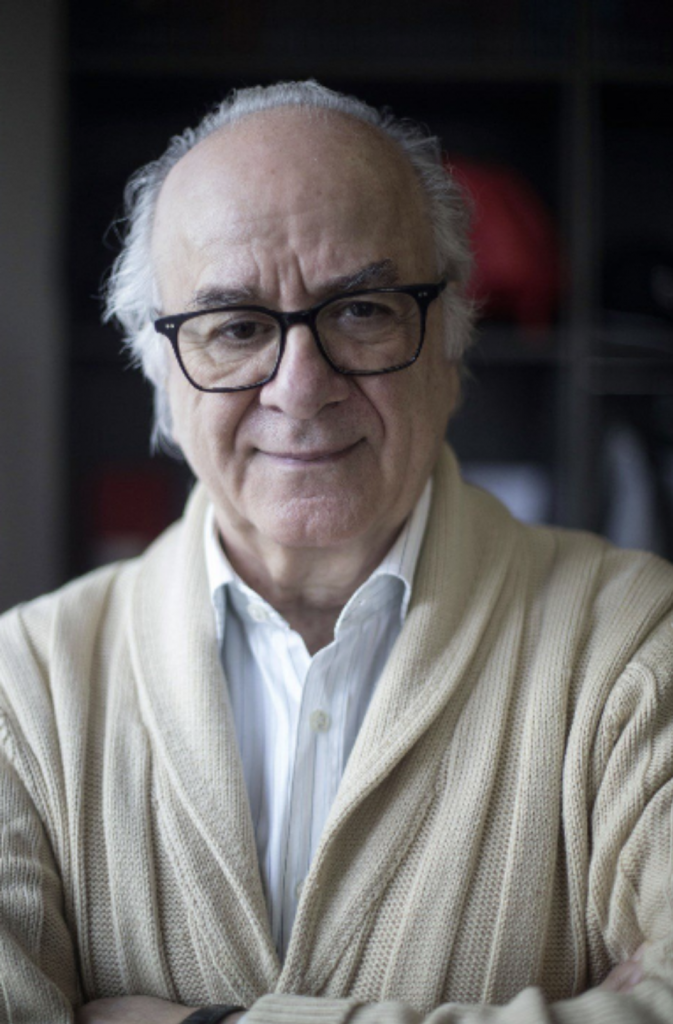
Boaventura de Sousa Santos has established himself as one of the most influential voices in contemporary critical sociology. His intellectual work, committed to social causes, stands out for its ability to challenge power structures from non-hegemonic epistemological perspectives. Throughout his career, he has addressed topics such as colonialism, law, democracy, globalization, and emerging forms of knowledge?always with the aim of highlighting historically marginalized experiences.
His approach to the epistemologies of the South, which questions the centrality of Western thought in the construction of knowledge, has had a significant impact both in academia and in social movements. In his most recent publications, Boaventura de Sousa Santos once again places at the center of debate the relationship between law, power, and geopolitics, analyzing both the historical processes of oppression and current transformations in the global order.
Rethinking Law from the South: Boaventura de Sousa Santos?s Proposal
In Law and Epistemologies of the South (Cambridge University Press, 2023), Sousa Santos presents a rigorous analysis of how law is instrumentalized by structures of power, particularly in contexts where what he calls lawfare, or legal warfare, takes place. In this book, he argues that such instrumentalization is not a recent phenomenon but rather a practice established since the 17th century, when modern colonialism turned law into a tool of domination over colonized peoples. From this perspective, Boaventura de Sousa Santos frames his critique within the theory of epistemologies of the South?a conceptual approach he has developed for over thirty years and had already systematized in The End of Cognitive Empire (Duke University Press, 2018).
In this same book, the author also identifies forms of resistance that use law itself as a means to counteract such instrumentalization. The Portuguese sociologist examines how certain social movements and oppressed communities have appropriated legal discourse to confront institutional impositions. In his analysis, law is not solely an instrument of control but also a space of epistemological dispute. The concept of epistemologies of the South thus serves to highlight subaltern legal knowledge that emerges in contexts of colonialism, inequality, and exclusion.
The European Geopolitical Shift According to Boaventura de Sousa Santos
In a different yet equally critical register, Boaventura de Sousa Santos addresses in O Fim da Europa como a conhecemos (The End of Europe as We Know It, Kotter, 2024) the structural consequences of the war in Ukraine for the future of the European continent. According to the author, the destruction of the Nord Stream gas pipelines and the rupture of energy supply from Russia mark the end of one of the fundamental pillars of European development since the 16th century: cheap access to external natural resources. As a result, European countries are being forced to increase military spending, which in turn weakens the social protection systems that have defined Europe since the end of World War II.
Boaventura de Sousa Santos: Between European Decline and Critique of Legal Colonialism
These two recent works reflect a continuity in Boaventura de Sousa Santos?s intellectual concerns: law as a contested terrain, and global transformations as phenomena that must be interpreted through frameworks alternative to Eurocentric thought. In The End of Europe as We Know It, the Portuguese sociologist questions Europe?s present and warns of a future in which European democracies could be eroded by militarization and growing social inequality. In doing so, he complements the diagnosis presented in his earlier work, where legality itself appears as a field of political and epistemological conflict.
Boaventura de Sousa Santos?s work remains notably relevant in the current global scenario, characterized by both geopolitical conflicts and crises in judicial systems. His insistence on recognizing alternative forms of knowledge?especially those emerging from historically oppressed contexts?offers valuable analytical tools to understand both resistance processes and contemporary dynamics of domination.
Who is Boaventura de Sousa Santos?
Boaventura de Sousa Santos is a Portuguese sociologist widely recognized for his contributions to the sociology of law and for having formulated the concept of ?epistemologies of the South??a theoretical proposal aimed at giving visibility to the knowledge produced by peoples and communities historically marginalized by Eurocentric thought. Born in Coimbra in 1940, he holds a Ph.D. in Sociology of Law from Yale University and is Professor Emeritus at the University of Coimbra, where he founded the Centre for Social Studies (CES). Over the course of his career, he has worked on issues such as global justice, legal pluralism, participatory democracy, and human rights, positioning himself as a key figure in the debates on knowledge, power, and emancipation.
Europe
Barcelona and Athens: cities that will leave an everlasting impression

Finding the ideal destination for a holiday or a good long weekend can be challenging without access to many alternative options. Luckily, there are cities that need no introduction to know that they hold the solution; such is the case with Barcelona, in Spain, and Athens, in Greece, which you should always have at the top of your list of potential places to visit.
Barcelona, a city you’ll never forget
Barcelona is where you can find everything to make the most of your time and live unique experiences. Just go online and search for a city guide of Barcelona to review everything and start planning your trip.
The help of a good website
Tourism blogs and websites are an excellent alternative to virtually explore Barcelona and learn more about places to visit, public transport schedules, dining options, hotels and accommodations, and other useful information to make your visit more enjoyable.
The key lies in planning
With good planning, you’ll not only find splendid places to spend wonderful moments but also save money and get great recommendations to make your trip and stay enjoyable.
Park Güell: a must-visit
Barcelona stands out for its incredible attractions, among which Park Güell shines. Just read more about this interesting place to fall in love with it and make this visit mandatory.
What is Park Güell?
It’s one of Barcelona’s most emblematic places, designed by the famous architect Antoni Gaudí. Originally conceived as a housing development and later converted into a public park.
Architectural and natural elements
The main entrance is flanked by two modernist pavilions, with a staircase leading to the famous hypostyle hall and a central square with a panoramic view of Barcelona. Additionally, it features over 17 hectares of gardens, viaducts, and winding paths, integrating architecture with the natural landscape.
Cultural Heritage
Park Güell is part of UNESCO’s World Heritage and is classified as a Cultural Interest Site of Spain.
Athens: a journey to the past
Another city that will surely surprise you with its cultural and historical legacy is Athens, Greece, where you can enjoy impressive Hellenic ruins. It’s advisable to visit an Athens travel guide on the internet before you go to learn about everything and better organise your visit.
Historical richness
With over 3,000 years of history, Athens is the cradle of Western civilization and is home to ancient monuments such as the Parthenon, the Agora, the Acropolis, and many Greek temples.
Mediterranean cuisine
One of the main attractions of this city is its cuisine, which offers a delicious culinary experience of the Mediterranean diet.
Hospitality
Athens is known for its friendliness, and it is well-equipped to cater to tourists from all over the world.
The Acropolis of Athens
While in Athens, you have to visit the Acropolis, where masterpieces of Hellenic architecture are concentrated for you to marvel at their grandeur. Keep in mind that it is a highly visited site, so you should book now to secure access for your visit.
Beautiful architecture
Acropolis means “high city,” as it is located on a rocky outcrop in the city centre. Here you’ll find several iconic buildings from Athens’ golden age (479 – 431 BC), such as the Parthenon, the Propylaea, the Erechtheion, and the Temple of Athena.
Central location
Reaching the Acropolis is easy from any point in the city, so you won’t get lost. From there, you’ll have panoramic views of the city spreading out at your feet.
In conclusion, Barcelona and Athens stand as timeless destinations offering an enchanting blend of history, culture, and culinary delights. Whether exploring the iconic landmarks of Barcelona or delving into the rich historical tapestry of Athens, these cities promise unforgettable experiences for travellers seeking adventure and discovery. With careful planning and the aid of modern resources, embarking on a journey to these vibrant metropolises ensures a truly memorable escape.
Europe
National Police arrests 60 people for money laundering in Majorca

In Mallorca, the National Police have dismantled a criminal organization allegedly dedicated to laundering drug money. According to preliminary investigations, those involved are alleged to have laundered more than one million euros over the last year.
At the moment, the authorities have arrested a total of 60 people for the alleged crimes of money laundering and false documentation. Although investigations are still ongoing, leading Spanish criminal lawyers have pointed to the possibility of an increase in the amount of money laundered.
In addition to this, specialists in Criminal Law and Financial Crimes such as Luis Chabaneix have pointed out that during the next few days the number of arrests could increase, both in Madrid and in Mallorca. It should be noted that of the 60 arrested, 55 were arrested on the island and the other five in the city of Madrid on Sunday, May 16.
Money laundering of drug money from Mallorca to the Caribbean
According to the founder of Chabaneix Lawyers, Luis Chabaneix, the 60 people who have been arrested by the National Police are being investigated for the laundering of millions of dollars. It is presumed that more than one million Euros from drug trafficking activities have been sent to Latin American countries such as the Dominican Republic and Cuba, and even shipments to the United States have been registered.
In these countries, the money diverted by the criminal association has been used for the purchase of real estate and vehicles. For this reason, the National Police is in permanent collaboration with the North American, Cuban and Dominican authorities in order to dismantle the activities of this group in the different countries.
Likewise, among the main information provided by the authorities, it should be noted that more than 400,000 Euros in cash were seized from the hands of those arrested in Mallorca. Similarly, the police searches carried out on the island led to the seizure of multiple luxury items and accessories, a total of three kilos of cocaine and approximately 60 kilograms of cutting substances.
Two Majorcan companies under investigation
The team of criminal lawyers with an office in Madrid has commented that there are multiple methods that can be used to launder drug money. In the particular case of the criminal organization headed by a nationalized citizen of Cuban origin, one of the methods used to divert the money was international bank transfers.
For this purpose, the use of linked bank accounts of certain front men was a fundamental element. In addition, the case includes investigations of split money transfers through call shops.
On the other hand, through an official statement, the National Police informed that two Majorcan companies have been linked to the ongoing investigation. The reason for this is the issuing of fraudulent invoices for a value close to 200,000 euros.
Through these methods, the criminal organization has managed to launder capital inside and outside the country, legalizing large sums of money allegedly originating from drug trafficking. Undoubtedly, the arrest of the 60 people involved, including the leader of the organization, is a serious blow to the laundering of drug money in Spain.



